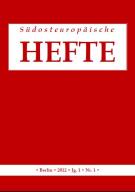Chief Rabbi Alexander Safran’s Struggle before his Expulsion from Romania
For better understanding Alexander Safran’s “struggle” in defense of the Romanian Jews’ rights after his election as Chief Rabbi of Romania, it is necessary to recount, if briefly, his itinerary, his education, his first writings and first stands.
More...

